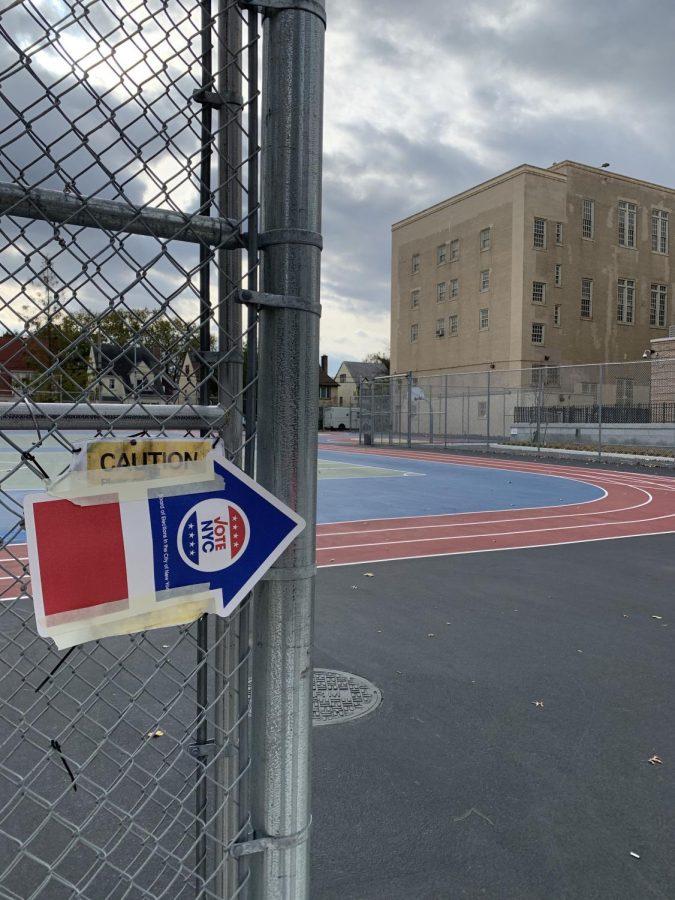What the Constitution Has to Say About a Delayed Election
There were questions over Trump’s COVID case and the election, and now in its wake he is threatening legal action, but what does the Constitution have to say?
PS-144 is one of many New York City public schools turned into a polling station during the election season. Typically bustling with activity, the playgrounds are currently empty, and the voting lines short, as schools go remote and mail voting has become more common in the wake of the Coronavirus pandemic.
While President Donald Trump has now recovered from COVID-19, there was plenty of uncertainty while he was still under the effects of the life-threatening virus, both for his health and its effect on the coming election just a month away.
This still begs the question, what would we do in the situation where we have to delay an election, or adjust it so that we can deal with an encumbered incumbent president? Even if this is not a pressing issue for the present election cycle, since the election was completed on November 3rd, 2020, it will no doubt rear its head again some time in the future. Laying a base of understanding of what we should do when an election must be delayed is important if this problem arises in our political sphere.
The de facto response to any question like this in America would be to look to the Constitution for guidance. It just so happens that the Constitution includes many provisions for a delayed election, something that Trump called for in July 2020 . Normally, per the 12th amendment, electors — representatives who directly voted for the president, and now follow the decisions made from public elections — make their decisions and cast their votes, which are then counted by the House of Representatives in order to determine the next president of the United States.
However, there is a deadline for this: if no president is elected before January 20th of the following year, then the vice president shall act as president, and the person with the greatest number of votes as vice president, shall be the vice president. What this means is that the current vice president would become the president, and the vice president who garnered the most votes (unless the one who won is already vice president, as they would be seated to be president) would become the new vice president. That is the case if an election is disrupted by the House’s deadlines, but could the deadlines themselves be changed?
While states would have the power to delay the election of electors, only Congress would be able to delay an entire election. According to the Congressional Research Service, while “the Executive Branch has significant delegated authority regarding some aspects of election law, this authority does not currently extend to setting or changing the times of elections.” Congress needs a previously set time to push back to, so as not to extend beyond any term limits. Thus, elections cannot be infinitely postponed. Therefore, an election may be delayed by Congress, but what reason do we have for delaying an election if the issue is found with the candidates’ ability to serve?
Succession law is just what it sounds like, a section of laws that presides over the exchange of power for the Federal government. In addition to outlining the line of succession in the case of an absence of a president or vice president, it lays out that the Speaker of the House would be the acting president until the term ends. However, it also opens a scenario where Congress can provide a case that there is not a president-elect or a vice president-elect who have qualified, which allows Congress to declare someone as acting president until a president or vice president has qualified.
The reason there is no one answer to what happens in the case of a delayed election or what the grounds are for delaying an election is because of a simultaneous strength and weakness of the Constitution: that it is up for interpretation. Since there are so many paths that are unclear or disputed, the government may choose to apply the Constitution in a wildly different way than anyone could imagine. Divya Sarma, a member of the graduated class of ‘20 voted for the first time in this election, and believed that a recount would be issued if the results were unclear and delayed, “something akin to Bush vs. Gore,” and something President Trump seems to be pursuing. Sadiq Sobur, ‘21, responded that a delay would be permitted, albeit going against precedent. In the end, there is no way to know what will occur in this scenario until it does. Contingency plans written for hypothetical situations will always lack the foresight that we have when living in these times, and as they say, hindsight is 2020.
This still begs the question, what would we do in the situation where we have to delay an election, or adjust it so that we can deal with an encumbered incumbent president?
Scott Ernsberger is a Managing Editor/Advisory Editor for ‘The Science Survey.' As a Managing Editor, Scott helps with copy-editing and keeping deadlines,...











